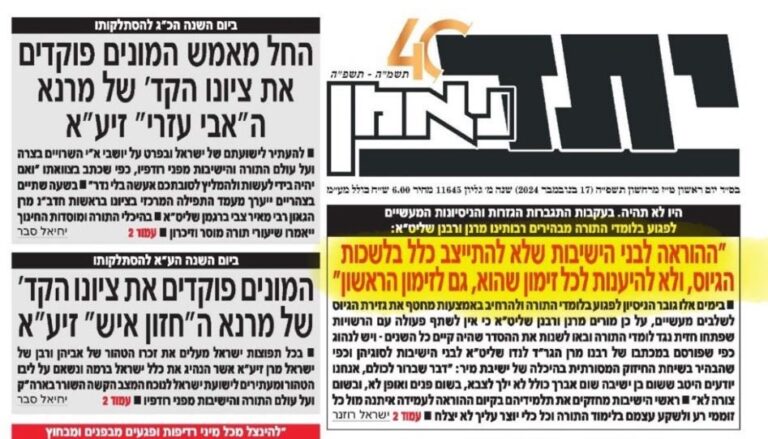 Summer time is travel time. Often we find ourselves in unfamiliar territory. The kosher consumer is faced with a number of potentially problematic kashrus situations: restaurants, concession stands in amusement parks, ice cream trucks, and rest stop food marts. Keep in mind what to watch for and verify that what you purchase meets the proper standards of Kashrus.
Summer time is travel time. Often we find ourselves in unfamiliar territory. The kosher consumer is faced with a number of potentially problematic kashrus situations: restaurants, concession stands in amusement parks, ice cream trucks, and rest stop food marts. Keep in mind what to watch for and verify that what you purchase meets the proper standards of Kashrus.
Beware! A kosher certificate posted in an establishment or on a food cart doesn’t automatically mean that everything in that establishment or food cart is certified kosher.
Kosher consumers must take the following steps:
1. Check for a kosher certificate.
This is usually on the wall or behind the counter. Just because you know people who eat there or because the owner looks “right”, does not mean the place has a good hechsher.
2. Read the kosher certificate carefully.
Check what the certificate is certifying. Sometimes, a store will post a certificate for items that they sell. But that does not mean that the whole store is kosher. If the certificate is only for some of the items in the store and not the whole store, you can not assume that everything in that store is kosher. It may not be! Only those items that are on the certificate are kosher. For example, a pre mix is an item that comes partially prepared, like a soft ice-cream mix or a cake mix. The store owner will put the mix into his own machinery and finish preparing it. The premix might have a proper certification but the equipment used to for the preparation also needs certification. The certificate might state that the premix for a muffin is kosher but once the mix is poured into the machinery and baked, the certifying agency does not take responsibility for the kashrus of the finished product. The store itself needs Rabbinic supervision. If you see a food establishment which claims to use only ingredients certified by reliable kashrus agencies and have kosher certificates posted attesting to the kashrus of the products being sold or used in producing the food sold in the store, but does not have supervision on the entire store, beware!!!! It probably does not meet kosher standards.
The KOF-K and most other kashrus agencies certify companies which have retail stores in multiple locations. The main facility and individual stores that request certification are inspected on a regular basis to insure that all the products meet our kosher standards. However, when a store is not under certification but claims to be using “kosher” ingredients, one can not be certain that their products are indeed kosher.
3. Be sure that the certifying agency or Rabbi is reliable.
Investigate hechsherim properly before relying on them. Consult a Rav who is familiar
with the various agencies and their standards.
4. Once you know that a certificate is only for certain products, make sure which products are actually listed as kosher.
It’s important to know exactly what is kosher in the store. For example, in a bagel store, the certificate might only apply to bagels and not the spreads and salads. Again, it’s important to read the certificate! If the certificate only lists some products, those are the only products in that store that are certified. Be sure that the kosher certificate lists the specific item you want to buy.
5. If a food that you want to buy is in an open bin and not in a package with a hechsher on it, then you can only buy that food if the entire store has good kashrus supervision.
If the certificate is only for some of the products in the store and not the entire store, unpackaged food in that store should be assumed to be uncertified. Sometimes, a store will buy a product in bulk and repack it in smaller containers to sell. Bulk repacked items should only be purchased from a store with a reliable hechsher supervising the repacking. The hechsher verifies that the re-packed product is from a reliable approved source. Sometimes a store prints their own label stating the original certification. It is necessary to have a reliable hechsher overseeing what has been packed in the container. Consumers should only purchase loose products from stores which are properly certified by a reliable kosher agency. With such certification, the kosher status of all products sold can be assured.
6. Food carts and ice-cream trucks sometimes advertise that they sell a “kosher brand” product. “kosher brand” does not mean that it’s kosher.
Check the individual label of the products or verify if the truck has a mashgiach and a reliable kosher certificate. The vendor claiming that a food is kosher, or posting a picture of the food you want to buy, is not enough! Remember: A seller’s non-kosher equipment
renders kosher items non-kosher. That means that kosher franks boiled in a non-kosher pot are not kosher and neither are sandwiches from such a seller, even though they may say kosher style like pastrami on rye.
7. Do not try to judge the kashrus of a product by reading the list of ingredients.
It’s easy to look at the list of ingredients on a candy or a bag of chips, for example and think that you recognize all of the products and know them to be kosher. But there are many ingredients that we can’t even pronounce such as additives, coloring and flavorings that may not be kosher. Even if you do recognize all the ingredients, the product could be made on the same equipment that is used for non-kosher food, rendering it not kosher.
8. Look for the hechsher each time you shop.
Sometimes we pick up a product like a candy bar and feel sure that it’s kosher because we’ve seen the kosher symbol on this product before. But it’s important to check each time before you buy! The product could change certifications, the hechsher may have expired and the product may no longer be under supervision, or you recognize a similar company and think the product that you have picked up is kosher. Not all products made by a company are kosher. (For example, a chocolate company can begin making ice-cream. Just because the chocolate has a hechsher doesn’t mean the ice-cream will too.)
Remember! When you go into a new store, rest stop, or food concession, keep these rules in mind. Check for a certificate, and carefully read it. And when you buy a product in a store, always check for the kosher label. Know what you’re putting in your mouth!
Have a Wonderful Summer!!!!
Any comments regarding this document should be addressed to Rabbi Moishe Dovid Lebovits – Rabbinical Administrator for the KOF-K at 1-201-837-0500 ext 127, or at [email protected]











26 Responses
One has to be very careful I had a story last year.
I went to Garden City Mall in New Jersey and purchased a soda but it did not have a Kov K on.The same soda in Brooklyn had a Kov k.
I called the Kov K they told me not evrey distribution center has a Kov K of that product.
I know this is only a soda but it could be anything……………..
Everyone should watch out. I have seen numerous chassidishe and heimishe people shopping at the dunkin donuts on the way to the mountains (I think its the harriman stop). that shop is under tablet-k which is not a reliable hashgacha.
rebshalom — PErhaps they were getting unflavored coffee, which (if I’m not mistaken) does not need a hechsher.
Sorry, the preceding should have been addressed to ecomajor. (Additionally, I’m referring to black unflavored coffee.)
who is the tablet-k and are you sure they are not reliable?
#3, who is the tablet k and are you sure that it is not relaible?
Be careful and don’t buy the unwrapped donuts in the 7 11 in Brooklyn and Queens. There is a paper from a Rabbi Marin (sp?) in Long Island indicating his hashkacha. Unfortunately, the Rabbi passed away more than 6 months ago.
My contribution: here are some restaurants in Manhattan under unreliable hashgachas. These are restaurants that are either themselves open on Shabbos or are certified by a hashgacha that gives hechsherim to other restaurants that are open on Shabbos. Note how frum the names sound!
United Kosher Supervision: Café Viva (Broadway & 97th), Ozu (Amsterdam & 87th), Quintessence (East Village), Viva Herbal Pizzeria (East Village), Magnolia (Upper West Side only)
Vaad Harabonim Lemeshmeret Hakashrut – Rabbi Israel Mayer Steinberg: 2nd Avenue Deli, Ben’s Deli, Buddha Bodai (Chinatown), Fine and Schapiro (W72nd St.), House of Pita (near Penn Station)
Rabbi Andre Malek: Café Blossom (Columbus btw. 82nd and 83rd), Blossom (Chelsea), Bonobo’s (Flatiron district), Yolato Gelato (Broadway btw. 82nd and 83rd)
Orthodox Kashruth Supervision: Caravan of Dreams (East Village), Chennai Garden (Lex. & 27th), Crumbs (5 locations), Yonah Schimmel Knishery (Lower East Side), Tiffin Wallah (Flatiron), Zaro’s Bread Basket (Grand Central)
Tablet-K: Azuri Café (Hell’s Kitchen), Eileen’s Special Cheesecake (SoHo), Ess-A-Bagel, H&H Bagels (Upper East Side only), Pick a Pita (38th St. btw. 7th and 8th), Great American Health Bar (E57th St. — but Cafe Classico above it is fine)
#3-
Who are you to bash the chushuve yidden running the tablet k?!?!
-angry charedi
A needed reminder of the obvious ala Mesilas yesharim.
In Canada, most prevalent are the COR and MK hashgachos. Where it gets very tricky are products which are under hashgocho in the US but not in Canada, even though the packaging looks very similar. The selection of kosher items in supermarkets outside of major Jewish communities is much smaller than those living in the US are accustomed to. So you probably should ‘schlep’ food with you.
yidishnamen,
The general rule with soda is that if we know the formula to be kosher, the soda is kosher no matter where in the USA it is bottled. The reason for this is that the formula is mixed in one location (for example Pepsi COULD be mixed in Purchase, NY) and would be shipped to the local bottlers. At the bottling company they could take a gallon of concentrate and mix it with 50000 gallons of water to make X amount of bottles/cans of soda. Everything in a soda company is cold and there are no ingredients used at the bottler that would be treif.
A possible exception to this rule could be grape soda. Welch’s Grape Soda used to be kosher only in the NY area which the hashgocha on the lids. There is real grape and the kosher formula is produced with Hashgocha T’midis.
I would sugest looking at http://www.kashrut.com for additional info. That is a very reliable site run by shomer torah u’mitzvos.
There was an ice-cream truck driving through Monsey with a Kof-K painted on the truck and the driver insisted that the same Rav who supervises “so and so” checks his truck every day and he only sells Kleins ice cream. the named Rav is reliable. I sent an email to the Kof-K and they told me that they will look into it. I am still waiting for the response.
this is just another thing to be in the lookout for
#3 & #9
It always amazes me when people purport to tell me what hasgocha is valid, but when it comes to other areas of halacha, the obvious answer is to consult with your Rav. Why is this different? Who are you to tell me with such certainty which hashkaga is kosher for my family?
#9
Please tell me, since you seem to be an expert on kashrus and are in fact doing malicious harm to businesses by telling people not to eat there: Why is a food establishment that is (majority) owned by non-Jews and opened on Shabbos an issue? If you said that the issue was bishul akum, that’s one thing. Do you not drink Coca Cola?
If it is in fact true that these businesses are 100% kosher, will you be issuing a check to them for lost business due to your comment?
In Europe most countries have a kashrus list available online, allbeit sometimes in a different language. Here in the UK we have a regularly updated list you can search on the United Synagogue website. Not many things have hecshers on the labels outside of Kosher stores. however we have less of a problem of unreliable hasgacha – all the Kosher restaurants here are indeed Kosher. (but some “jewish” restaurants are not)
#10 charedi,
try it like this:
******#3, are you sure? actually i am under the impression that tablet-k is run by chushuve yidden and is actually quite acceptable. if you are aware of something else, please let me know, thanks.******
The issue of whose hashgocho is reliable and whose is not is probably best determined between an individual and his rov, rather than an individual, in this Internet forum, declaring with a blanket statement that this or that hechsher is not reliable.
In the spirit of the Three Weeks, and in fear that by saying something good about one of the rav ha’machshirim noted above, someone will fire off something bad about the man, I will say this: with regard to one of the rabbonim whose hechsher is noted above, he is a shomer Shabbos yireh shomayim who earned his smicha the hard (i.e., the right) way, who knows how to learn, who understands halacha, and who is a gomel chesed shel emes. If your rov holds a different shita in various aspects of hilchos kashrus, and you follow your rov, then that is fine, do not eat from that label.
But others may hold differently, and that should be acknowledged.
Talking about hechshairim,would anyone know if chug chasam sofer a reliable hechsher or can it be chalov akum (if the machinery wasn’t kashered…
the carvel store in sloatsburg / big apple rest on the thruway ha a letter that everyting in the store is kosher / siogned / xyz, carvel quality control. talk about self certifying!!!!
to #19 – micky — email them! oops — they dont have a web site!
to #9 — these rabbonim who are giving these hechsherim are good rabbonim whom you would not hesitate to eat in their home, but they decided , for whatever reason, to give hechsherim to jewish owned businesses that are open and cook on shabat! that is the history of judaism in america. study history — oops! yeshivot do not allow such studies!
speaking about sloatsburg / big apple rest area on the thruway — the dunkin donuts on the other side of the highway — same rest area, has one of those hechsherim, but only on the donuts and coffee, not on the bacon! do they cook separately?
To #15 justajew and #18 telegrok,
I have done nothing more than state the facts. These restaurants are open on Shabbos. If you call them and ask them, “Are you open on Saturday,” they will tell you, “Yes, sir, would you like to make a reservation?” I have made no distortions. I will clarify that House of Pita and the Crumbs bakery on 42nd St. (specifically that one) are not open on Shabbos.
Anyone who, out of a fit of some distorted holier-than-thou religiosity or otherwise, chooses to eat there, may do so. Those restaurants will be happy to serve you. I can assure you I have cost them no business; The Great American Health Bar is doing just fine. If you are offended by the very idea that someone would warn others that these restaurants are not what they may think they are, I can’t really help you.
I will add one other thing: I’m not an expert, I don’t have s’micha, but I do know there is not one restaurant certified by the OU, OK, Kof-K, Star-K or similarly well-known brand that is open on Shabbos. I leave to you to determine for yourself whether that is a weird coincidence or proof positive that those agencies are run by maniacal fools.
feivel,
You are right. My tone was a little harsh. It just bothers me that during the 3 weeks, we continue to bash choshuve yidden. #3 (ecomajor) is the reason the bais hamikdash hasn’t been rebuilt.
#15, would you really want to eat in an establishment that is open on Shabbos (even if owned
by non-Jews). Obviously, it isn’t being supervised
then. Can you rely on Goyim to know and abide by
halochos. How about bishul akum? With regard to your comment concerning bishul akum and Coca-cola, be aware that not all foods/drinks fall under the
requirement to be bishul Yisroel. The food has to
require cooking to be edible and it must be food fit
to be served to a king or a royal meal. Thus, for
example, carrots need not be bishul yisroel….
to #21 dan daoust
the ou, ok, kof-k, star-k, others have NO problem with restaurants open on shabat, provided that it is not owned by a jew, and its not meat restaurant.
great american health bar (i believe) is not owned by yidden. actually they usually serve business time clientele, so shabat should not be a problem for them, but check this last statement out.
the real problem is some carvel stores that are owned by jews, and are open on shabat, yet, i understand, they have a valid teuda, by acceptable hechsher, even though they are open on shabat. (i presume has to do with the contract they have with the franchisor.)
#20 and #22
there are many items and establishments that the ou, chof-k etc put their stamp on that are open on shabbos – where non-jews are assumed to follow kshrut rules even when unwatched. #22 you say this is ok bc coca cola and carrots are not bishul akum – there are many establishments on the “questionable list” that would also be ruled out if we made decisions on bishul akum
pas akum is similar to bishul akum – so a bakery franchise might have to be judged differently than a restaurant – hence crumbs, H & H or dunkin donuts (I have not researched these establishments – they might still be owned by Jews). Its possible that frozen yogurt would also not fall under the category of bishul akum and be different as well. We should not categorically outlaw certain hechshers – there are some that while problematic for a restaurant might be fine for a bakery
we are dumbing down kashrut for the masses instead looking at the detailed discussions in our tradition.
I personally know that the tablet – k is one of the most unreliable hashgochos. This is not from hearsay this is from actual observation. Many of their stores have a certificate stating that all profits/ownership of the venue is owned by a goy on shabbos. I once saw a pizza shop in queens with their teudah and this sign mentioning some siman in shulchan aruch on it listed. I went into the store on shabbos and started talking to the owner in hebrew. I asked him if he knew what his teudah said he said no. I asked him if he gets the profits from shabbos he said yes. I called up the owner of that hashgacha and told him what happened. He kept on repeating but it says in shulchan aruch and would not listen to me. This is the only hashgacha that I personally witnessed with my own eyes that is truly unreliable. I dont know if their policies have changed since his petirah, but I have not heard otherwise.
I went into the crumbs restaurant just today! Everything looked ok until i saw yidden veering away from the store after a quick examination of the oKs hashgacha. I then realised that they make/sell sandwhiches in the store! These sandwhiches contain meat but the workers are quick to say that they are not covered under the hashgacha. Obviously this poses several problems which need investigation (i will attempt to do this if i can).
On another note: The tablet K hashgacha does look abit ‘dodgy’ but in my experience you cannot always place a blanket rule over every hashgacha. Can anyone tell me if their fish sticks are ok? Has anyone done the research?